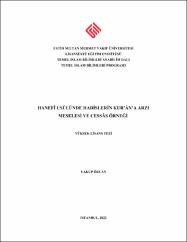Hanefî Usûlünde Hadislerin Kur’ân’a Arzı Meselesi ve Cessâs Örneği
Citation
ÖZCAN, Yakup, Hanefî Usûlünde Hadislerin Kur’ân’a Arzı Meselesi ve Cessâs Örneği, Fatih Sultan Mehmet Vakıf Üniversitesi Lisansüstü Eğitim Enstitüsü Temel İslam Bilimleri Anabilim Dalı Temel İslam Bilimleri Programı, Yayımlanmamış Yüksek Lisans Tezi, İstanbul 2022.Abstract
Hanefi mezhebi özellikle haber-i vâhidleri, kabul, anlama ve yorumlama
noktasında özel bir yönelime sahiptir. Haber-i vâhidi diğer delillerle tutarlı anlama
adına birçok prensip geliştirmişlerdir. Bunların başında hiç şüphesiz asıllara
muhâlefet etmeme şartı ve bunu sağlayan arz yöntemi gelir. İşte bu çalışmamızda
asılların ilki olan Kur’ân’a arzı Hanefi düşüncesinde Cessâs’ın taşıdığı noktayla ele
almaya çalıştık.
Çalışmamız giriş ve sonuç dışında üç bölümden oluşmaktadır. Birinci
bölümde Kur’ân’a arzın tanımı, kapsamı ve tarihçesiyle konuya başlanmıştır. Bu
noktada öncelikle Hz. Peygamber (s.a.v.) ve sahabe dönemlerindeki Kur’ân’a arz
teorik ve pratik olarak incelenmiştir. Sonrasında Hanefi usûlünde arz çeşitleri tespit
edilip, tezin konusu olan Kur’ân’a arz yöntemi kurucu imamlardan başlayıp mezhep
içinde oluşan ekollere gelinceye dek ele alınmıştır. Bu bölümle ayrıca Kur’ân’a arza
mesafeli durduğu söylenen Hanefi usûlcülerinin yaklaşımlarına ve günümüz
Kur’ân’a arz yorumlarının nasıllığına da temas edilmiştir.
Tezimizin ikinci bölümünde Cessâs’ın hayatı, ilmi kişiliği ve Kur’ân’a arz
anlayışı çalışılmıştır. Arz anlayışında öne çıkan noktalardan, arz için getirdiği
delillerden, prensiplerden ve özellikle itizâlî yönelimi neticesinde arzı itikâdî alana
genişleterek görüşlerine dayanak kılmasından bahsedilmişitir.
Üçüncü bölümde ise Cessâs’ın arz anlayışındaki özgünlük uygulamalarla
gösterilmeye çalışılmıştır. İtikâdî ve fıkhî arz olmak üzere iki kısımda ele aldığımız
bu bölümde hem kelâmî hem de fıkhî konulardaki arz örnekleri incelenmiş, özellikle
itizâlî tercihleriyle kelâmî örneklerdeki arz anlayışı arasındaki ilişki ortaya konmaya
çalışılmıştır. Ayrıca fıkhî arzdaki ilkesel tavrını itikâdî arzda ne derece sağladığı
incelenmiştir. The Hanafi school has a special orientation in terms of acceptance,
understanding and interpretation, especially of the news-i-wahids. They developed
many principles in order to understand the news in a consistent manner with other
evidences. The foremost of these is undoubtedly the condition not to oppose the
originals and the supply method that provides this. In this study, we tried to deal with
the reference to the supply to the Qur'an, which is the first of the originals, with the
point of Cessâs in Hanafi thought.
Our study consists of three parts except introduction and conclusion. In the
first chapter, the subject has been started with the definition, scope and history of the
Qur'anic offering. At this point, first of all, the supply to the Qur'an in the periods of
The Prophet (s.a.v.) and the Companions has been examined theoretically and
practically. Afterwards, the types of offering in the Hanafi method were determined,
and the method of supplying the Qur'an, which is the subject of the thesis, was
discussed starting from the founding imams and coming to the schools formed within
the sect. This section also touches upon the approaches of Hanafi scholars, who are
said to be distant from the supply to the Qur'an.
In the second part of our thesis, the life of Cessâs, his scientific personality
and his understanding of supply to the Qur'an were studied. It has been mentioned
about the prominent points in his understanding of supply, the evidence he brought
for the supply, the principles, and especially as a result of his italic orientation, he
expanded the supply to the field of belief and made it a basis for his views.
In the third part, the originality of Cessâs' understanding of supply has been
tried to be shown with applications. In this section, which we have dealt with in two
parts, namely creed and jurisprudence, examples of offerings on both theological and fiqh subjects have been examined, and especially the relationship between itizâlî
preferences and the understanding of supply in theological examples has been tried
to be revealed. It has been examined to what extent he achieved his principled
attitude in fiqh supply in theological supply.



















